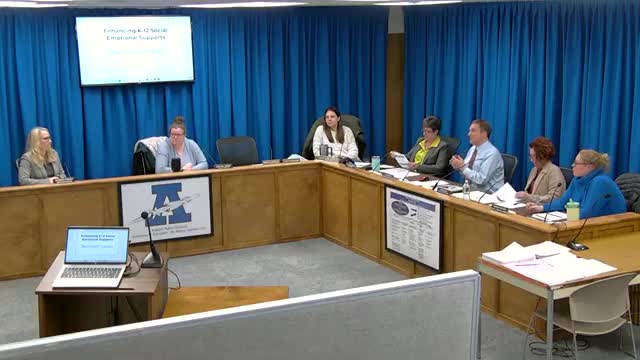District pilots Lenny Learning for ‘brain health literacy’; teachers have created 273 lessons
Get AI-powered insights, summaries, and transcripts
Subscribe
Summary
Auburn staff reported adoption of Lenny Learning (an AI-assisted, research‑vetted lesson builder) for brain health literacy and social-emotional lessons; district teachers created 273 lessons and administered 1,224 student surveys since rollout.
Auburn Public Schools staff reported that the district has adopted Lenny Learning to support brain health literacy and social‑emotional learning at the middle and high school levels and beyond. The district launched the program on Oct. 11 and staff said teachers have created 273 lessons, 1,224 student surveys have been administered at the middle and high school levels, and 120 staff members were active users.
The Teaching and Learning presenter described Lenny Learning as a controlled AI tool that generates classroom lessons based on parameters teachers set (age group, time available, goal, strategies and accommodations) and pulls content from vetted sources including Harvard Medical School, Yale, Columbia, University of Pennsylvania, MGH, Dartmouth and Mount Sinai. The presenter said Lenny’s interface can produce a teacher guide with videos, readings and discussion prompts within roughly 30 seconds, and that the system is designed to reduce the time teachers spend searching for vetted resources.
Examples reported to the committee included lessons on gratitude, goal-setting, understanding substance abuse, decoding advertisements, STEM challenges and lessons adapted for pre-K through high school. Staff said teachers in content areas beyond health and PE—science and other content teachers—have created lessons and used the tool for classroom activities. The presenter said Lenny can also generate recommendations for educators when a school’s aggregated climate survey highlights a particular area of concern, such as supportive relationships or school engagement.
The committee was told the Lenny Learning content is built on research-based sources and that the district used the tool’s climate survey module to gather baseline measures of school dimensions such as school safety, school expectations and social awareness. Committee members asked questions; no formal action was taken on the Lenny Learning presentation.
